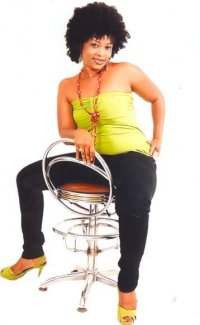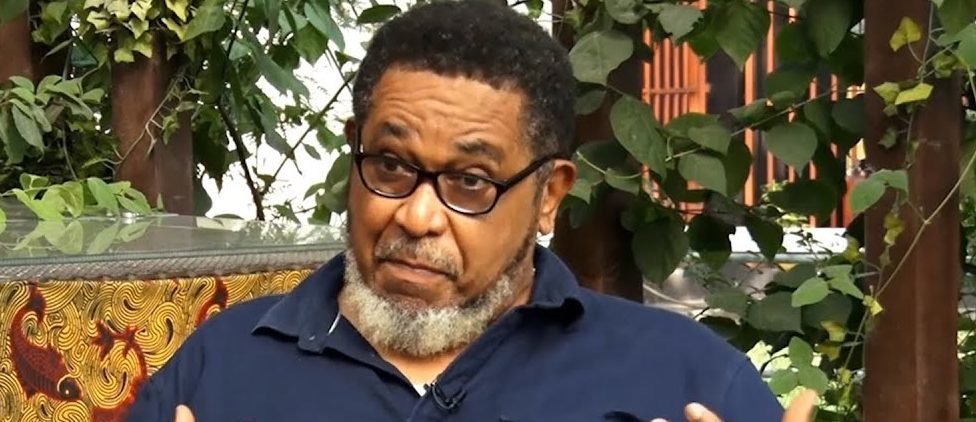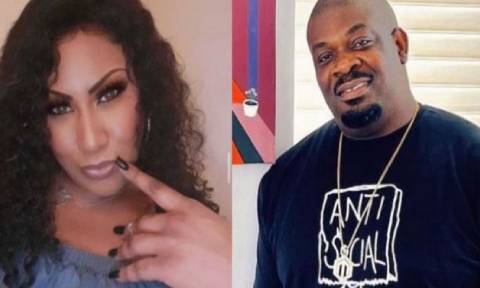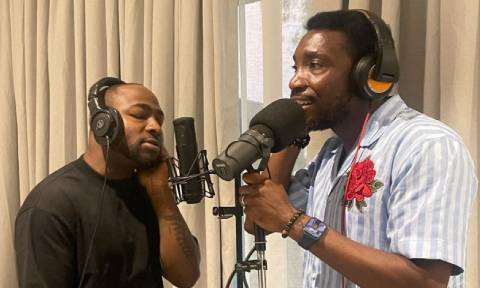For people who are familiar with the rested Village Headmaster fame, Femi Robinson is not a new name. For besides acting the lead role of the Village Headmaster to the must-watch sitcom comedy, prior to Justus Esiri who took over from him, he contributed immensely to seeing to the longevity of the programme by writing a total of 33 scripts.
This University of Nigeria (UNN) graduate of Biology (Botany) did not allow his fame to die with the Village Headmaster but has been doing well for himself by consulting for various organisations and writing not just any plays, but that which Nigerians can relate with, in their immediate environment. He is indeed of the Nigerian nativity, canvassing for the Nigerianisation of our movie contents inclusive of costumes, for he believes that every movie/film/stage play should not only represent the image of the country to the outside world but also have a message for its viewers. If a movie is shot just for the sake of entertaining the viewing public without any tangible message for the sociopolitical class, to Robinson, it is arrant nonsense.
He also acted the lead role, Odewale, in late Ola Rotimi’s ‘The gods are not to blame.’
He was born at Abeokuta, Ogun State on September 27, 1940 to a P and T civil servant who was being posted to various stations of the organisation in the country leading him to not having a stable early education. He had his primary schooling at Abeokuta, Enugu, Port Harcourt and Lagos. His secondary education was at Kings College, Lagos where he was a guitarist with his school musical band with the likes of Segun Bucknor and during which period Kings College was always engaging in musical competition with St. Gregory’s College musical band which had Sir Victor Uwaifor as a member.
Because he believes that anything worth doing at all is worth doing well, when he gained admission to study Botany at UNN, he also enrolled in the school’s College of Music and got tutored in trumpeting by the late Samuel Akpabot. He felt happy with himself playing guitar for the College’s musical band not knowing that fate had a different plan for him.
He gave a load down of how he coincidentally ventured into acting. “During that time at UNN, they were doing this musical drama called King Kong, the guy who was supposed to act the role of Lucky in the drama at the last minute gave the producer a shocker that he was not going to act again. This made the producer to start running around asking for who can help him. I decided to give it a shot, I went and acted it and became the Lucky guy. And from then on, there’s not being any going back.
“When we brought the play from UNN to University of Ibadan, the likes of Prof Soyinka and Adelugba saw it and were so much impressed about the role I played that they asked who this guy is. Thereafter, they invited me to act with them in Ibadan during the holidays.”
Having discovered this other side of him, he set out to polish it to an enviable level by heading to London for a postgraduate diploma in theatre business administration at the University of Wales, Cardiff.
Though, his parents never sent him to go and study theatre acts, they never acted negatively to it when they heard about it. Besides, his mother, who is still alive and gifted with story telling, has always been an actress. She used to act in church plays and also does take Robinson to watch Ogunde. He describes his mother as a woman who is gifted with the ideas she hears and retains and able to write very well. According to him most of the stories he writes about are the stories told him by his mother about things that happened in the past.
As he graduated from UNN he didn’t go straight into acting. “I was expected to go abroad for further studies, but because I did my special project on Tobacco, I had my eye to work in Nigeria Tobacco Company (NTC). But unluckily for me, I did not get the position I wanted in NTC. Thank God, because then I was a chained smoker, so if I had joined NTC perhaps, I would have chained smoked the more. We were not smoking because it was going to do anything to us but to create a class for ourselves as we were regarded as being the tough guys in town. If you were smoking a particular kind of cigarette, people would think you an intellectual. There were quite a lot of misconceptions about quite a whole lots of things in those days then and we lived by it. But as science started taking over in the country all these little myths that people had changed.”
Having been denied the post he requested for in NTC, he took to teaching the sciences in a girls’ secondary school before his appointment as a laboratory technician at the University of Ife. It was at Ife that he was exposed to Ola Rotimi and his drama group, though still in the science department. It was then he was called upon to act Odewale in The gods are not to blame and many other lead plays that were done in Ife then.
It was while he relocated to Lagos that he got married and was invited over to audition for Village Headmaster where he acted for several years.
As a young promising guy, there were a lot of ladies who were positioning themselves as wives to him. “I had some principle about my life that I knew I needed somebody who would be able to understand me and understand my life style and three somebody who was going to be like a sister, someone who would be able to understand the ups and downs of life and someone who would realize that her duty is at the home and not just playing around. I met somebody who was like a sister and who could live with me.
Today, a lot of people go into acting basically for economic reasons, but for them then at Village Headmaster, though they benefited economically, they had a different motive for participating in the plays.
“When we were acting Village Headmaster, there was a vision. It interested us because it was the only way we could talk to the leaders at that time, especially when the military was on. It gave us an opportunity to be able to talk to them without annoying them because before then some people who tried to do some drama and productions that had direct reference to the military were picked up. So Village Headmaster that time gave us a very good opportunity and made a lot of people learn how to write a beautiful piece without annoying the military. In fact, the military enjoyed it at that time. They used to sit down to watch it.
It wasn’t because of the money per se because I was earning N80 for acting and same amount for writing a whole episode which was quite a whole lot of money. With it some of us were able to save and buy a piece of land. I was able to buy 10 acres of land at Magboro area which I decided I was going to use as a film village.
We didn’t do it for money but because we loved it.
He assesses the performance of the movie industry. “The movie industry today has been taken over by those who do not know what they are doing. First of all, America did not start their movie industry because they just wanted to start a movie industry. They started it to show the world that crime does not pay, even in the cowboy film, you always have the Sheriff that would always make sure that the bad man is caught and punished. They have a reason for doing it.
“But in Nigeria, those people who went into movie production only went into it just to entertain people. You want people to see how to kill, rape and rob people and you don’t end up letting people know that the security forces, the law, the traditional and cultural laws that we have will ask them questions. They are not looking at Nigeria and our belief system. Everyday you see our actors and actresses in the movies wearing foreign dresses, staying in houses that are so big, houses that they can’t live-in in reality. They are already teaching people to be rogues, to live above their means.
“We don’t look at our society to write. I don’t see them as having achieved anything except copying what other people have been doing and that’s why I don’t do anything with them. It is not that I don’ want to act with them, but I don’t see myself being in that particular mood. If anybody writes a play that I see traditionally, is going to move my country forward, I would even be willing to assist.
For Robinson, one particular situation poses a problem to him, the fact that the way he talks is being grossly misunderstood by some people. Sometime ago someone even referred to him as a clown.
Since he has nothing to do with retirement now, he spoke on what has been occupying his time of recent.
“My latest work Ajantala (the great wind that blew in the market square) was the play that was written for the 50th anniversary of Nigeria’s independence. It talks about Nigeria in 1960 where some Nigerian children (Igbo, Hausa, Yoruba) were playing in the market square and there was this tornado that dispersed the children. The whirl wind was the bomb that dropped in Lagos, Katsina many, many years ago. Immediately the bomb dropped, the Igbo ran away and went to the East, the Hausa ran away, the Yoruba ran away. From then on they started having political intrigues that happened in this country. It shows a child that was selected by the gods and the gods made sure that he went through all these intrigues in the land of the living dead for 49 years and on the 50th year, he emerged as a stronger well disciplined man ready to rule the state. Now that we are going into 2011, we are going into a new era. An era which I believe would bring about well trained, disciplined Nigerians who would be candidates and rule for the masses and not for their pockets. The play answers a very important question at the end that we are the ones to realize that the impossible is for the dead but the possible is for the living and since we are all in the land of the living, we should all be talking about the possible which is hope.
Added to Ajantala is another yet to be released work, Black Gold (crude oil), which though a blessing has brought with it some other negative consequences on the Nigerian society.
Robinson, in referring to himself as not a filmmaker but an artist, because he sees what others do not see, says he has a mission to tell Nigerians that they are not making good use of what God has given to them.



















